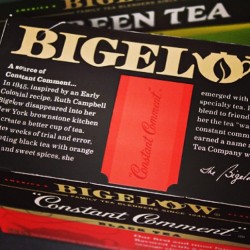Top Class Actions’s website and social media posts use affiliate links. If you make a purchase using such links, we may receive a commission, but it will not result in any additional charges to you. Please review our Affiliate Link Disclosure for more information.

According to this recent ruling, U.S. District Judge Jeffrey S. White also found that plaintiff Alex Khasin could not pursue legal claims against the tea manufacturer for the allegedly misleading black tea labels, as she had only purchased Bigelow’s brand name green tea. This prompted the plaintiffs’ attorneys and plaintiff Adam Victor to file a separate Bigelow tea mislabeling class action lawsuit lodging claims against the manufacturer for the alleged misrepresentations of their brand name green teas.
The amended Bigelow tea mislabeling class action lawsuits also feature new claims by the plaintiffs of unjust enrichment and clarified how Khasin and Victor separately visited Bigelow’s company website and viewed the allegedly misleading statements about their black and green teas’ health benefits.
The Bigelow class action lawsuits allege that these statements about the products’ health benefits had been rejected by the FDA, therefore, “It would be against equity and good conscience to permit defendant to retain the ill-gotten benefits defendant received from plaintiff and the class, in light of the fact that the products were not what defendant purported them to be,” the plaintiffs claim.
In the wake of Judge White’s dismissal of Khasin’s Bigelow black tea claims and Victor’s filing of his mislabeling class action lawsuit, both of these Bigelow tea mislabeling class action lawsuits were transferred before U.S. District Judge William H. Orrick. According to the amended complaints, Khasin and Victor claim they purchased the green and black Bigelow teas because they read about certain health benefits on the Bigelow product packaging, which featured a link to the tea company’s website.
On the website, under the section titled “health,” Bigelow makes claims that their tea products have the ability to prevent artery clogging, fight cancer, and even fight off flu, among other named health benefits available to consumers if they drink the green and black teas. In their tea mislabeling class action lawsuits, the plaintiffs allege the Bigelow black and green teas are misbranded, and base their claims on an FDA warning letter sent to the company’s competitor, Unilever PLC, which made similar health benefit claims about their Lipton brand teas.
According to the amended Bigelow class action lawsuits, Bigelow should have been aware of the agency’s letters to its competitors and subsequently adjusted their tea labels, because in their warning labels the FDA informed Unilever that the agency expected other companies, like Bigelow, to also make label changes. However, according to Khasin and Victor’s complaint, Bigelow made no move to make these label and fall into compliance with the federal agency’s warning.
The Bigelow tea mislabeling class action lawsuits further allege, “As a result of Defendant’s violations of the ‘misleading prong’ of California Business and Professions Code …, Defendant has been unjustly enriched at the expense of Plaintiff and the Class. Misbranded products cannot be legally sold or held and had no economic value and are legally worthless. Plaintiff and the Class paid a premium price for the misbranded Black Tea Products.”
The two Bigelow tea mislabeling class action lawsuits propose differed Class Periods. Khasin’s complaint proposed a Class that would include all California Bigelow consumers who purchased the brand name green tea since May 2, 2008, while Victor’s mislabeling class action lawsuit proposes that the Bigelow tea class period start on June 25, 2009.
The plaintiffs are represented by Ben F. Pierce Gore of Pratt & Associates and J. Price Coleman of Coleman Law Firm.
The Bigelow Tea Mislabeling Class Action Lawsuits are Alex Khasin, et al. v. R.C. Bigelow Inc., Case No. 4:12-cv-02204; and Victor v. R.C. Bigelow Inc., Case No. 3:13-cv-02976, in the U.S. District Court for the Northern District of California.
ATTORNEY ADVERTISING
Top Class Actions is a Proud Member of the American Bar Association
LEGAL INFORMATION IS NOT LEGAL ADVICE
Top Class Actions Legal Statement
©2008 – 2024 Top Class Actions® LLC
Various Trademarks held by their respective owners
This website is not intended for viewing or usage by European Union citizens.















3 thoughts onPlaintiffs File Amended Bigelow Tea Mislabeling Class Action Lawsuits
Bigelow Tea rocks! They are one of the only good flavored teas out there & really should NOT be sued! If they made a mistake, I am sure they will fix it. What has become of this sue crazy world? Are we going to start suing our parents next if we feel they could have raised us better?
I have purchased this, for many years in hopes that the tea was good for health reason. I purchased many different flavors including, black and green tea.
Why did you post that?